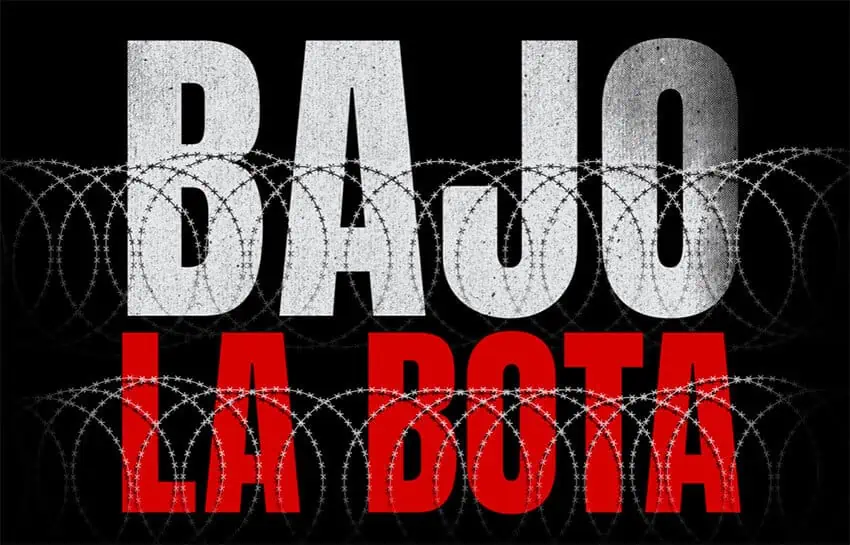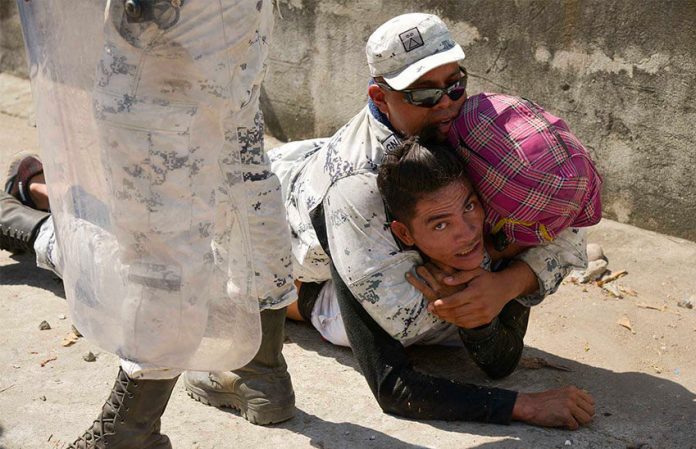Arbitrary detentions, excessive use of force and sexual violence are among the abuses committed against migrants by the armed forces and the National Guard, according to a new report by six non-governmental organizations.
The Bajo la Bota (Under the Boot) report by the Foundation for Justice and the Democratic Rule of Law and five other groups examines the militarization of migration policy in Mexico and compiles testimonies from scores of migrants.
“Mexico has opted for the implementation of a migration policy without a human rights focus, making use of the National Guard and other military forces as an apparatus of migration control even when this goes against migration regulations and international human rights law,” the report said. “… The National Guard members [carrying out] migration tasks don’t act as guarantors of rights but as agents of contention and deportation or even as generators of risks for migrants and their families,” it said.
As a result of interviews with 76 migrants from African, Latin American and Caribbean countries, the NGOs documented cases of arbitrary and illegal detentions, racial profiling, violence against women and the excessive use of force.
“I’m always very scared of the police and the National Guard – when we go to buy things, when we’re walking, at any time of day or night. It’s a fear of being taken to the [detention center]. They don’t care if you’re an asylum seeker, they don’t care if you have children and a wife. The National Guard doesn’t care about anything,” said a Haitian migrant in Tapachula, Chiapas, a hub for migrants who have crossed the border with Guatemala.
“Every time I walk I see the police arresting people. The police asked me for identification and took it from me. They said it wasn’t valid. They searched me, they touched my body,” said a migrant from Cameroon.
A Nicaraguan woman recalled being detained in Chiapas along with her three young children even though they had been granted humanitarian visas. National Guard members and National Immigration Institute (INM) agents subsequently took them to a town on the border with Guatemala and dumped them in the middle of the night with the expectation they would leave the country. They and other migrants were warned they would be sent to a detention center if they entered Mexico again.
“My children were crying. They were afraid that the guards were going to shoot us with the big guns they were carrying,” the woman said. “… They took us to Talismán and threw us out like rubbish.”

The report said the use of the National Guard to combat the flow of migrants through Mexico is “one of the main institutional legacies” of the pressure imposed by the administration of former United States president Donald Trump on Mexico. Mexico deployed troops to its southern and northern borders in 2019 after Trump threatened to impose blanket tariffs on Mexican exports to the U.S. if the Mexican government didn’t do more to stem migration.
The six NGOs, among which are also Sin Fronteras (Without Borders) and Derechos Humanos Integrales en Acción (Comprehensive Human Rights in Action), said the militarized migration policy pursued by the current government “has deepened the risk contexts for migrants and asylum seekers, … especially those who are more vulnerable due to reasons of gender, race and ethnicity.”
“In addition, it forces migrants to travel along clandestine routes, making them more vulnerable to different kinds of human rights violations and crimes such as enforced disappearances, kidnapping, extortion, human trafficking and corruption as well as racial and ethnic discrimination, extreme climate situations and accidents,” the report said.
Bajo la Bota also said that the National Guard makes arbitrary arrests based on racial profiling and harasses people of color. “Migrant women of African descent in Mexico are exposed at all times,” said a Haitian woman.
“We can’t hide, our skin color is visible, our skin color annoys the racists. The National Guard and the INM treat us like prostitutes, make rude gestures to us, follow us when we’re walking, follow us inside stores. In stores, … we have to walk with our hands up to show them we’re not stealing,” she said. “… We’re not human beings for them, we’re trash. … We walk on large avenues, never on small streets because … the police and troops could attack us.”
The report also documented abuses committed against women at detention centers, including a case of a Honduran woman who was detained in Ciudad Juárez, Chihuahua. Guardsmen “strip women, put their fingers in their vaginas or put a gun in them,” the woman said.
The report said that 44% of the abuses occurred in Chiapas, the main entry point for migrants, most of whom intend to travel to the United States. Citing data from January, it also said that over 28,000 soldiers, National Guard members and INM agents – including almost 14,000 guardsmen – were deployed to the southern and northern borders to stop migrants, a strategy that ensures that many never reach their desired destination.
Hundreds of thousands have been detained in recent years, with many deported to their countries of origin.
The NGOs made numerous recommendations to the federal government, among which were to withdraw military forces and the National Guard from migration control tasks and to stop detaining and effectively incarcerating migrants.
They also called on the government to terminate any policies or agreements with the U.S. government that violate the human rights of migrants and refugees. The international principle of non-refoulement – which prohibits returning a person to a country where their safety or life could be threatened – must be respected, the NGOs said.
Mexico News Daily
